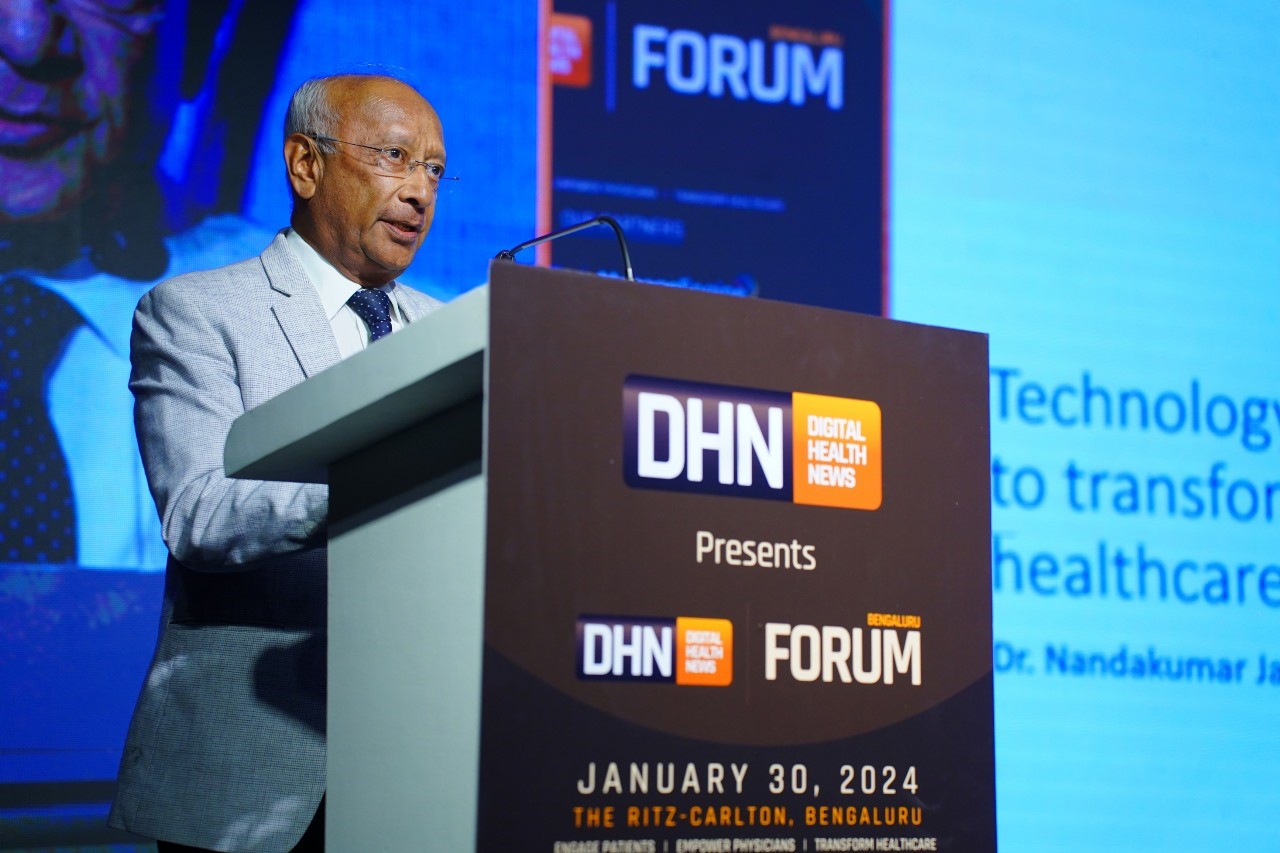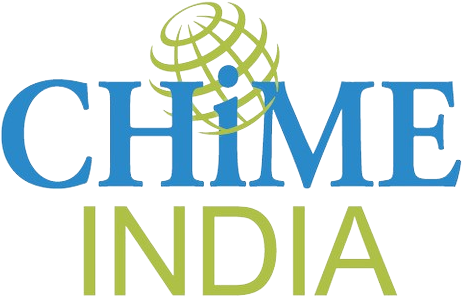Written by : Jayati Dubey
February 8, 2024

Technology with its omnipresent impact, is revolutionizing every segment; the impact is immensely evident in healthcare delivery. Talk about doctor appointments, getting reports conveniently or a teleconsultation, we are reaping the benefits of technology in healthcare. Yet, all is not a cakewalk.
Presenting captivating thoughts in an engaging keynote session at DHN Forum Bengaluru, Dr Nandkumar Jairam, chairman, Medica Synergie Hospitals, shared a few relevant pearls of wisdom. His discourse not only reflected on the transformative journey of healthcare through technology but also shed light on the challenges and strategies for fostering widespread acceptance among stakeholders.
Dr Jairam delved into his own professional experience, drawing attention to the defining years he spent at the Columbia Asia Group of Hospitals. He recalled how the year 2004 marked a significant milestone when, in the heart of India's rudimentary healthcare infrastructure, Columbia Asia decided to embark on a paperless journey from day one. This move laid the groundwork for a transformative expedition that encompassed the entire spectrum of healthcare operations.
Talking about the adoption of technology, Dr Jairam said, "We must understand that technology has will and continues to transform healthcare in every aspect of its existence. It is unfair to assume that only clinical, finance, or operations will benefit from such a transformation. The tool to transform healthcare in technology can achieve many things. You can reduce the cost of care, enable better utilisation of infrastructure, improve clinical utilisation and clinician utilisation, ensure that the average length of stay comes down, outcomes improve, and therefore, the experience, processes, and the user experience will all change."
Acknowledging the formidable challenges associated with infusing technology into existing healthcare systems, Dr Jairam underscored the importance of a right approach.
Starting from scratch offers a unique advantage, enabling the establishment of processes and systems where technology becomes an intrinsic part of the organisational DNA. This, he noted, applied not only to administrators but also to clinicians and every stakeholder involved.
Resistance to change, Dr. Jairam highlighted, was a universal phenomenon present in every sphere of life, and healthcare was no exception. Convincing stakeholders to move away from entrenched patterns and embrace technological innovation was identified as a crucial hurdle.
Further, Dr Jairam extended his discourse to the multifaceted landscape of stakeholders, identifying key players such as clinicians, staff, regulatory bodies, insurance companies, and boards of directors.
Each group, he noted, presented its unique set of challenges in embracing technological change. Boards of directors, often characterised by fixed ideas, required a nuanced approach involving effective lobbying and persistent efforts to convey the value of technological investments.
Clinicians, on the other hand, were classified into different categories based on their attitudes toward change. Young, technologically sound clinicians were identified as allies, while fence-sitters and more resistant, seasoned practitioners required tailored strategies.
According to him, making the young and energetic clinicians the leaders will help propagate the ideas to the rest of the clinical community as they will become the team's strength, enabling the transformation in more than one way.
As for the next category, he stated that converting the fence-sitters requires patience and effective communication, emphasising the value and importance of the change. Understanding their perspectives and pain points is crucial for successful transformation.
And lastly, he noted that dealing with resistant senior consultants involves supporting and encouraging voluntary engagement with the team. The aim is to make them see the change as a collaborative effort where everyone ultimately emerges victorious.
Dr Jairam emphasised the need to engage and support clinicians in a gaming fashion, allowing them to perceive the technological transformation as a victory in their professional journey.
Staff, often more amenable to technology, needed a similar approach to clinicians but with a recognition of their distinct characteristics. According to him, the engagement should be focused on acceptance, considering staff as an essential part of the technology team.
Moving beyond the internal dynamics of healthcare institutions, he pointed out the challenges posed by external entities such as statutory and insurance bodies, especially in regions such as India.
Dr Jairam noted, "In health insurance today, the movement of data from the hospital to the insurer is still primitive. While technology has come in, it is slow and still not universally done. Because of this, there is a delay of enormous amounts of time and complications in the sense of back and forth for failure to understand the methods of collecting the data and the fact that much of the data is manual. We need to see this change happen in these stakeholders because only then can your transformation into technology be complete."
He further acknowledged the transformative potential of the National Digital Health Mission in India as a significant catalyst for accelerating this change.
In the complex healthcare industry, Dr Jayaram deemed determining the return on investment for technology nearly impossible. However, he emphasised the importance of evaluating each technological opportunity based on efficiency, costs, and the product's ability to adapt and upgrade over time.
He said, "There is no doubt that technology comes at a cost, but optimising this cost to ensure that we put in what is appropriate in terms of cost and get the maximum return on that investment is possible, appropriate and most essential. The cost has to be understood and tackled in a manner that is appropriate, and of course, efficiencies of utilising that investment need to be shown."
Communicating these insights, particularly to board members and administrators, was identified as a critical aspect of successful technological integration.
However, a cautionary note was sounded regarding the blind adoption of new technology without thorough evaluation. Dr Jairam cautioned against treating technology like a new toy, emphasising the importance of evaluating its impact and potential pitfalls.
Underlining the ever-evolving nature of technology, he stressed the importance of setting aligned short-term and long-term goals. He further emphasised the necessity of succession planning to ensure continuity in the transformation journey, preventing disruptions due to leadership changes.
Looking ahead, Dr Jairam expressed anticipation for the disruptive potential of artificial intelligence (AI) in healthcare.
"All of us know about artificial intelligence, and it is my firm belief that this will disrupt the way technology is applied to healthcare in today's world. The manner in which it is applied and the efficiencies that it creates would be enormous, and it would completely transcend what we have done so far in technology in healthcare," he added.
While acknowledging the current neonatal stage of technology in healthcare, he envisioned AI and other technological advancements playing a pivotal role in addressing chronic health conditions and shaping the future of healthcare delivery.
The College of Healthcare Information Management Executives (CHIME) is an executive organization dedicated to serving senior digital health leaders. CHIME includes more than 5,000 members in 56 countries and two US territories and partners with over 150 healthcare IT businesses and professional services firms. CHIME enables its members and business partners to collaborate, exchange ideas, develop professionally and advocate the effective use of information management to improve the health and care throughout the communities they serve. CHIME's members are chief information officers (CIOs), chief medical information officers (CMIOs), chief nursing information officers (CNIOs), chief innovation officers (CIOs), chief digital officers (CDOs), and other senior healthcare leaders. The CHIME India Chapter became the first international chapter outside North America in 2016 and is now a community of over 70+ members in India. For more information, please visit www.chimecentral.org
